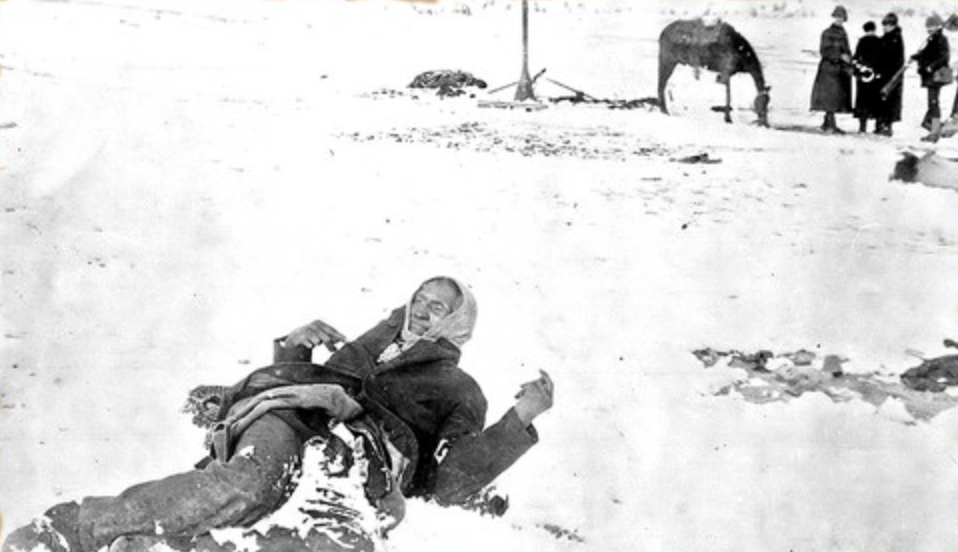
- Details
- By Levi Rickert
Opinion. Today marks the 133rd anniversary of the Massacre of Wounded Knee during the wintry week between Christmas and New Years back in 1890.
Nine days before the massacre that left hundreds of Sioux men, women, and children dead, an obscure weekly newspaper in South Dakota ran an editorial about the death of the Hunkpapa Lakota leader Sitting Bull. In the opinion piece, L. Frank Baum, publisher of the Saturday Pioneer, wrote:
“The Whites, by law of conquest, by justice of civilization, are masters of the American continent, and the best safety of the frontier settlements will be secured by the total annihilation of the few remaining Indians. Why not annihilation? Their glory has fled.”
Early in the morning on Dec. 29, 1890, across the state of South Dakota at Wounded Knee Creek, the Sioux, who were captured the previous afternoon by members of the US 7th Cavalry Regiment, were surrendering their weapons. A shot was fired. The Calvary proceeded to shoot unarmed and innocent Sioux elders, women, and children. While an accurate account will never be known, it is believed between 250 and 300 Sioux were massacred that day.
Snowfall was heavy that December week. The Sioux ancestors killed that day were left on the frigid wintery plains of the reservation before a burial party came to bury them in one mass grave.
 Make A Donation Here
Make A Donation Here
After the mass killing of Natives, Baum picked up his poisonous pen again and wrote another editorial for his Saturday Pioneer newspaper. This time, he wrote:
“The Pioneer has before declared that our only safety depends upon the total extirmination [sic] of the Indians. Having wronged them for centuries we had better, in order to protect our civilization, follow it up by one more wrong and wipe these untamed and untamable creatures from the face of the earth. In this lies future safety for our settlers and the soldiers who are under incompetent commands. Otherwise, we may expect future years to be as full of trouble with the redskins as those have been in the past.”
Ten years later, Braum wrote a children’s book called The Wonderful Wizard of Oz. Yes, that one. It was eventually made into one of the most famous movies of all time. When I was a youth, my siblings and I would make popcorn and sit and watch the movie when it was broadcast yearly. As an adult, I discovered Baum’s hatred and poisonous racism towards Native Americans. Suffice it to say, I stopped watching the film.
Now, I realize Braum did not single-handedly cause the genocide of Native Americans. But, he contributed to it with his editorials and his calls for the extermination of Native people. His family later apologized for Baum’s racist editorials.
This is why history matters. If you know your history, you know your place in this world.
In recent weeks, the Republican presidential front-runner, former president Donald Trump, has stated in his stump speech that immigrants entering the U.S. illegally are “poisoning the blood of our country.” There has been pushback that Trump borrowed the line from Adolf Hitler’s rhetoric in his autobiographical manifesto Mein Kampf, which set the principles behind Nazi Germany’s genocide of more than six million Jews.
Trump denies reading the book. I don’t doubt his claim because he is known for not being a reader. But I’m guessing that some of his speech writers and political advisers may have — and they certainly play a role in the words that come out of candidate Trump’s mouth.
I suspect most Americans don’t subscribe to the belief that immigrants are poisoning the blood of our country.
I also believe that most Americans would agree that racism has been a true poison in our country throughout the last two centuries, though it’s not something we’ve been able to eradicate.
That’s why it’s important we remember the Massacre of Wounded Knee, as well as the rhetoric and words used to justify it. Because it’s a potent reminder of what racism has led to in this country: the death of innocent Native people whose ancestors lived on this land since time immemorial.
Thayék gde nwéndëmen - We are all related.
More Stories Like This
The SAVE America Act Threatens Native Voting Rights — We Must Fight BackThe Presidential Election of 1789
Cherokee Nation: Telling the Full Story During Black History Month
Jesse Jackson Changed Politics for the Better
Native News Online at 15: Humble Beginnings, Unwavering Mission
Help us defend tribal sovereignty.
At Native News Online, our mission is rooted in telling the stories that strengthen sovereignty and uplift Indigenous voices — not just at year’s end, but every single day.
Because of your generosity last year, we were able to keep our reporters on the ground in tribal communities, at national gatherings and in the halls of Congress — covering the issues that matter most to Indian Country: sovereignty, culture, education, health and economic opportunity.
That support sustained us through a tough year in 2025. Now, as we look to the year ahead, we need your help right now to ensure warrior journalism remains strong — reporting that defends tribal sovereignty, amplifies Native truth, and holds power accountable.
 The stakes couldn't be higher. Your support keeps Native voices heard, Native stories told and Native sovereignty defended.
The stakes couldn't be higher. Your support keeps Native voices heard, Native stories told and Native sovereignty defended.
Stand with Warrior Journalism today.
Levi Rickert (Potawatomi), Editor & Publisher

